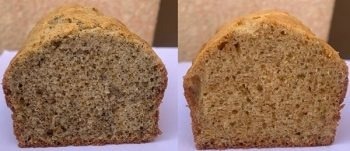Researchers, as reported in ACS Omega, have added used tea or coffee powders into sponge cake batter, creating a snack that is not only more nutritious but also has a longer shelf life.
 These sponge cakes, fortified with spent tea leaves (left) or coffee grounds (right), were more nutritious and lasted longer than controls. Image Credit: Mohamed Mahmoud
These sponge cakes, fortified with spent tea leaves (left) or coffee grounds (right), were more nutritious and lasted longer than controls. Image Credit: Mohamed Mahmoud
Tea and coffee rank as two of the most widely consumed beverages globally, second only to water. Beyond just providing caffeine, they are packed with bioactive substances, including antioxidants, fiber, and essential nutrients like potassium and calcium. However, in the process of making these drinks, many of these valuable compounds end up left behind in the coffee grounds or tea leaves.
In the past, spent tea or coffee has been used in animal feeds and agricultural compost. Surprisingly, very few researchers have explored the idea of incorporating these coffee and tea byproducts into human food for nutritional enhancement. Abdelrahman Ahmed, Khaled Ramadan, Mohamed Mahmoud, and their team sought to change this by introducing spent tea and coffee powders into sponge cakes. They aimed to examine the nutritional and sensory qualities of these cakes and assess their shelf life.
To make these powders, the researchers brewed either black tea or Arabica coffee and then carefully washed, dried, and ground the leftover tea leaves or coffee grounds. They mixed these powders with the flour used in the sponge cake batter in varying amounts – 1%, 2%, or 3% – to create different cake versions.
The cakes with added spent tea or coffee powders exhibited higher levels of antioxidant activity and increased concentrations of essential nutrients compared to cakes made with regular flour alone.
However, a sensory panel noted that loaves with higher levels of spent tea powder had less favorable sensory attributes, mainly due to their darker appearance. On the other hand, cakes with spent coffee powder were more comparable in terms of appearance, taste, and texture to the control cakes.
Furthermore, the fortified cakes had a slightly longer shelf life and showed less microbial growth even after being stored for up to 14 days. The researchers believe that this research could open up new ways to recycle what would otherwise be wasted materials and enhance the nutritional value of various food products.
Source:
Journal reference:
Ahmed, A., et al. (2023). The Bioactive Substances in Spent Black Tea and Arabic Coffee Could Improve the Nutritional Value and Extend the Shelf Life of Sponge Cake after Fortification. ACS Omega. doi.org/10.1021/acsomega.3c03747.